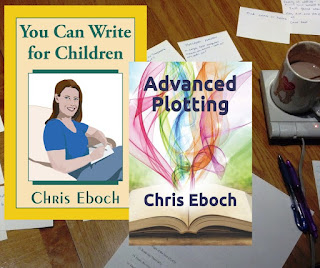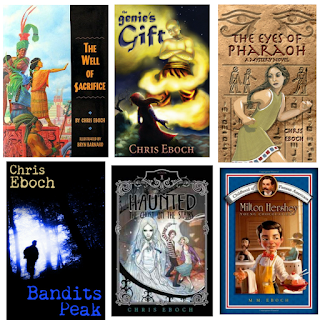Bring your writing career to the next level! Take a self-paced video writing class with Chris Eboch, the author of over 100 books for children and two dozen novels for adults written as Kris Bock. Chris has led popular writing workshops around the world.Advanced Plotting—Keep Those Pages Turning
Learn advanced techniques that will make a decent plot
dynamic. Understand the promise of your first chapter. Then start with a “grab
you by the throat” opening. Once you’ve caught the reader’s attention, you’ll
want to pack the plot full. But how do you make sure you’ve done that? Check
out these tools to analyze your plot. Once your plot is strong, learn
techniques to maximize your pacing, including cliffhanger chapter endings to
drive the story forward. Novelists will benefit from these insights, whether
you are just starting out or have years of experience. Many techniques work for
memoires, nonfiction, and even picture books too!
Take this online course at your own pace. It includes six
videos plus handouts with notes and more resources for $100. You can hire me to
work with you one-on-one for an additional fee. Get Advanced Plotting here.Please note: If you are new to EzyCourse, you will need to sign up and
get a password first. Then return to the course page to enroll and pay. You
will not have access to the course until you "Complete Purchase."
Educational Publishing: Make Money Writing for the Educational Market: Do you want to make money from writing? Are you willing and able to write on assignment if given a topic, word count, grade level, and deadline? Then you may be perfect for educational work for hire! Get it here.
Also available: You Can
Write for Children
Learn about children’s publishing—opportunities and challenges, genres, age
ranges, book and magazine markets, and resources to keep you going. This
three-session video course is $60. Get
You Can Write for Children here.You
can also go straight to the source and hire me to review your manuscript. See
rates and recommendations here. Or if you
prefer to learn from books, check out Advanced Plotting and You Can Write for Children on Amazon.
Chris has over 100 books for children published under the names Chris Eboch and M. M. Eboch. Her novels for ages nine and up include The Eyes of Pharaoh, a mystery in ancient Egypt; The Well of Sacrifice, a Mayan adventure used in many schools; and The Genie’s Gift, a middle eastern fantasy. Jesse Owens: Young Record Breaker and Milton Hershey: Young Chocolatier are inspiring biographies focused on them as children and young men. Learn more about Chris Eboch books at her website. Her writing craft books include Advanced Plotting and You Can Write for Children: How to Write Great Stories, Articles, and Books for Kids and Teenagers. 




.jpg)



.jpg)

.jpg)


